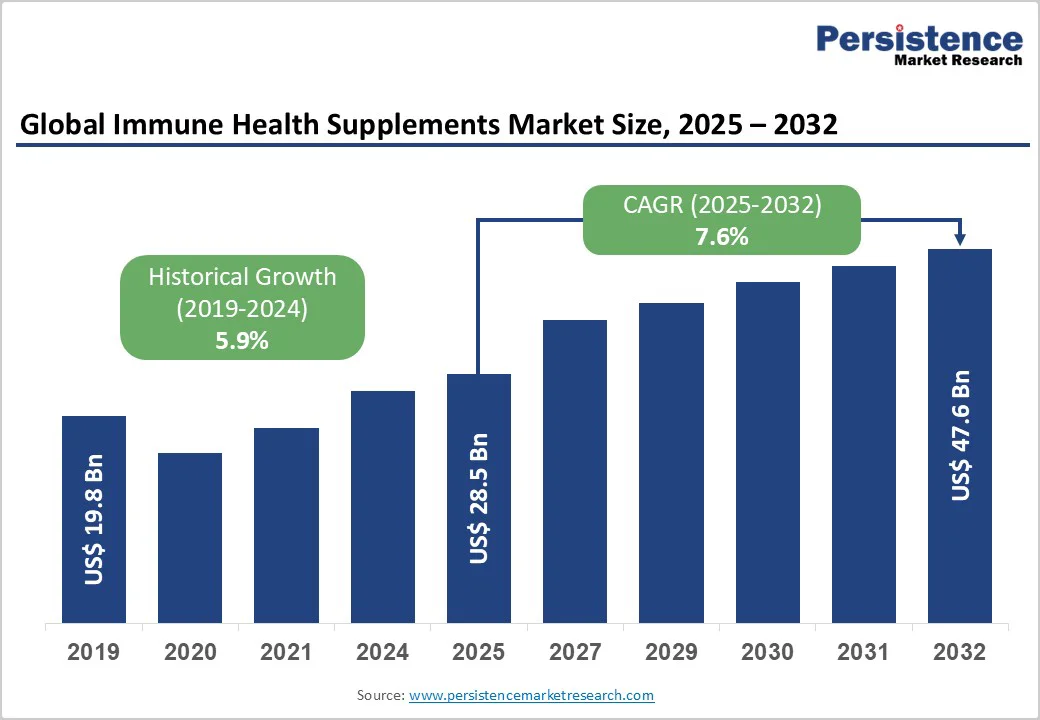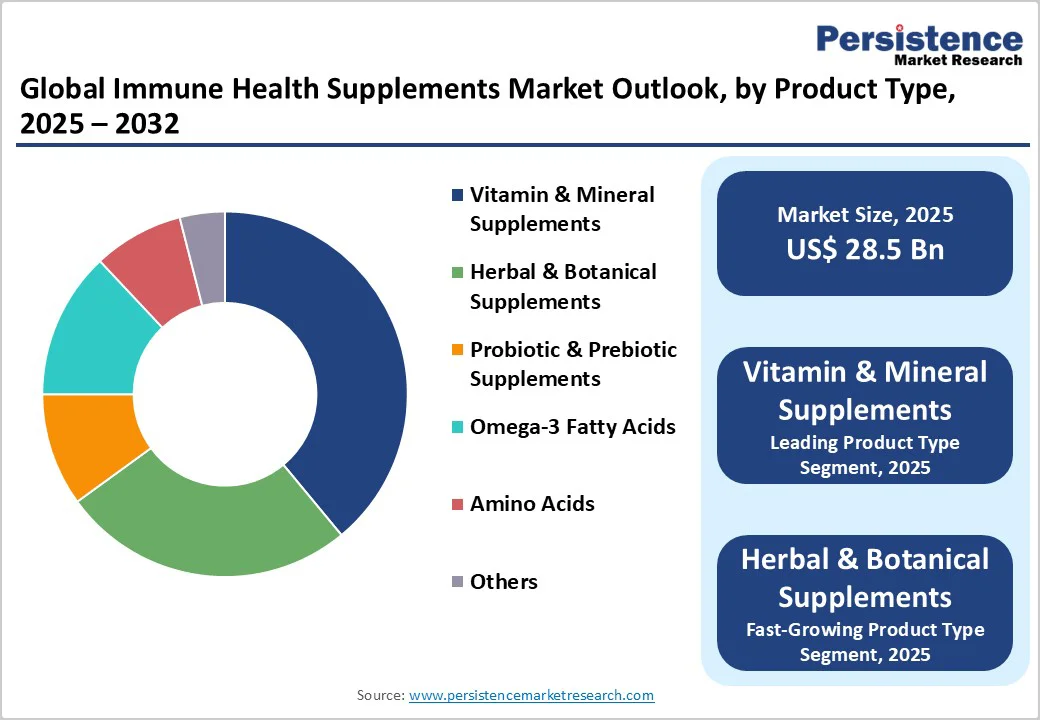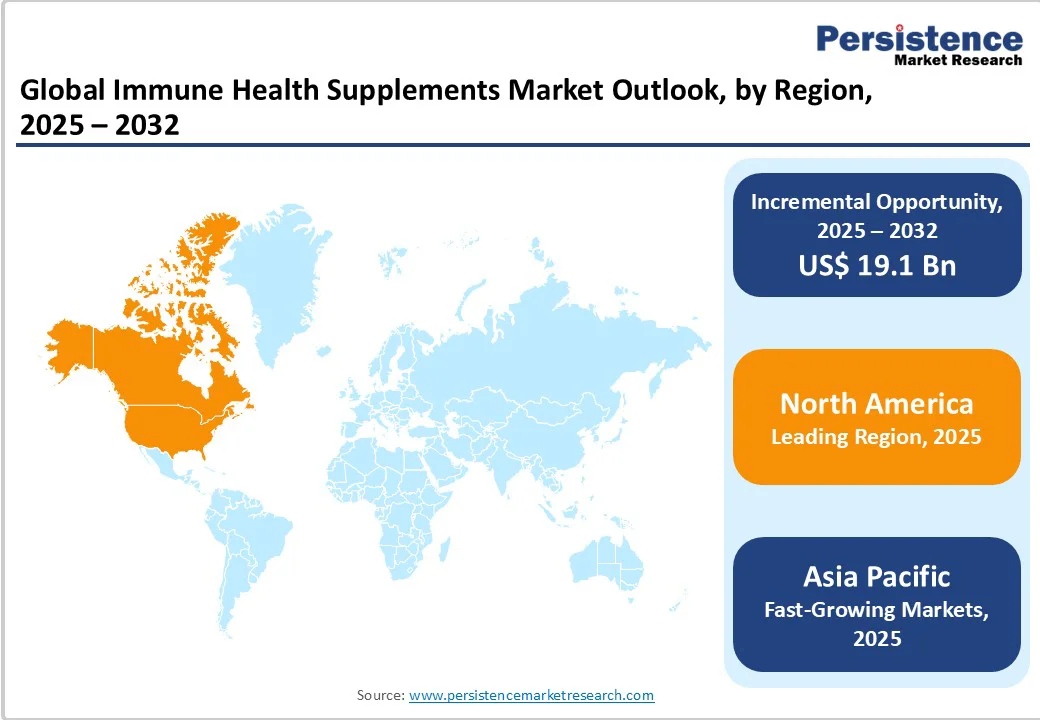ID: PMRREP5852| 199 Pages | 20 Nov 2025 | Format: PDF, Excel, PPT* | Food and Beverages

The global immune health supplements market size is likely to value at US$ 28.5 billion in 2025 and projected to reach US$ 47.6 billion at a CAGR of 7.6% during the forecast period from 2025 to 2032.
| Key Insights | Details |
|---|---|
|
Global Immune Health Supplements Market Size (2025E) |
US$28.5 Bn |
|
Market Value Forecast (2032F) |
US$47.6 Bn |
|
Projected Growth (CAGR 2025 to 2032) |
5.9% |
|
Historical Market Growth (CAGR 2019 to 2024) |
7.6% |

A growing societal shift toward proactive health management is fueling demand for immune health supplements across global markets. Consumers are increasingly prioritizing prevention over treatment, seeking daily nutritional support to strengthen immune resilience against infections and lifestyle-related stress. Heightened awareness following recent global health crises has transformed immune health from a seasonal concern into a year-round priority.
According to Persistence Market Research, 76% of consumers are drawn toward immunity claims on food and beverage products, reflecting strong behavioral alignment with preventive wellness trends. This has encouraged manufacturers to innovate with science-backed ingredients such as vitamin C, zinc, probiotics, and botanical extracts. The expanding integration of immune-boosting components into functional foods, beverages, and nutraceuticals further solidifies the sector’s growth trajectory within holistic health and wellness ecosystems.
A growing concern surrounding counterfeit and adulterated herbal ingredients is undermining consumer confidence in immune health supplements. Unscrupulous suppliers frequently dilute or substitute authentic botanicals with cheaper, low-quality materials, compromising product efficacy and safety. Such practices create inconsistencies in ingredient potency, leading to unpredictable health outcomes and regulatory scrutiny.
The absence of standardized global quality control frameworks further intensifies the challenge, particularly within fragmented supply chains spanning multiple regions. This erosion of trust discourages repeat purchases and pushes consumers toward clinically verified or pharmaceutical-grade alternatives. As transparency becomes a decisive factor in brand credibility, manufacturers are increasingly pressured to invest in traceability systems, third-party testing, and clean-label sourcing to safeguard authenticity and restore market integrity.
The convergence of artificial intelligence and personalized nutrition is opening a new frontier in the immune health supplements market. AI-driven subscription models leverage genetic data, microbiome profiles, and lifestyle analytics to curate precision-based supplement regimens aligned with individual immunity needs. These platforms continuously learn from user feedback, wearable data, and dietary behavior to adjust formulations in real time, ensuring optimal nutrient delivery.
For startups, this model creates recurring revenue streams and deeper customer engagement through data-driven customization. Established players are exploring AI partnerships to integrate predictive health algorithms into their product ecosystems. The shift toward personalization reflects growing consumer demand for tailored wellness solutions, positioning AI-powered immune supplement programs as a major growth avenue in preventive and functional health innovation.
Vitamin & mineral supplements hold approximately 38% share as of 2025, reflecting their essential role in maintaining immune system function and overall metabolic health. Consumers increasingly rely on these products for daily nutritional balance, driven by modern diets that often lack key micronutrients such as zinc, vitamin D, and vitamin C. Their strong clinical validation and universal applicability across age groups reinforce their market leadership. Herbal and botanical supplements, rich in adaptogens such as echinacea and elderberry, are gaining traction among users seeking natural immune support. Probiotic and prebiotic supplements are expanding through their proven role in gut-immune modulation, while omega-3 fatty acids appeal to those focused on anti-inflammatory benefits. Despite diversification, vitamins and minerals remain the foundation of global immune health supplementation.
Online retail is projected to grow at a CAGR of 8.8% during the forecast period, driven by the expanding digital health ecosystem and shifting consumer buying habits toward e-commerce platforms. The growing preference for convenient, subscription-based supplement purchases has boosted direct-to-consumer sales, enabling brands to build personalized relationships with health-conscious consumers. Enhanced product visibility, customer reviews, and access to expert consultations online are influencing purchasing decisions, particularly for functional and immunity-focused supplements. Digital marketplaces are enabling smaller brands and startups to reach global audiences without heavy distribution investments. With advancements in AI-driven recommendations and secure payment systems, online retail continues to reshape how consumers discover, evaluate, and purchase immune health supplements across diverse demographic and regional segments.

North America holds approximately 33% of the global immune health supplements market, driven by a maturing consumer base seeking preventive, science-backed nutrition solutions. In the U.S., demand is being propelled by rising health awareness, clean-label preferences, and the rapid adoption of personalized supplement regimens powered by digital health platforms. Brands such as Herbalife, NOW Foods, and Amway are leading the way with innovative formulations combining vitamins, minerals, and probiotics to enhance immune resilience. Canada is witnessing a surge in plant-based and organic supplement offerings, reflecting growing interest in sustainable wellness. The expansion of e-commerce channels, subscription models, and AI-based nutrition personalization continues to redefine the regional landscape, positioning North America as a hub for premium, data-driven immune health solutions.
Asia Pacific Immune Health Supplements Market is expected to grow at a CAGR of 8.6%, driven by increasing health awareness, preventive wellness adoption, and rising disposable incomes across key economies. In China, functional supplements infused with traditional herbal ingredients such as astragalus and ginseng are gaining traction among urban consumers seeking natural immunity boosters. India is witnessing strong momentum in Ayurveda-inspired nutraceuticals and vitamin-enriched gummies that appeal to younger demographics. Japan’s aging population continues to fuel demand for scientifically validated, probiotic-based immune products emphasizing gut health. Singapore is emerging as a hub for premium, clean-label formulations supported by government wellness initiatives and advanced retail infrastructure. The region’s fusion of traditional health wisdom and modern science is shaping a dynamic, innovation-led immune supplement market.

The global immune health supplements market is moderately fragmented, with established nutraceutical leaders and emerging startups competing through innovation, transparency, and scientific validation. Leading companies are strengthening product portfolios with clinically backed formulations and investing in advanced R&D focused on microbiome modulation and plant-based immunity boosters. Startups are leveraging digital health analytics and personalized supplement models to attract tech-savvy consumers.
Growing awareness around natural wellness is accelerating demand for herbal supplements featuring ingredients such as turmeric, echinacea, and elderberry. Certifications like GMP, NSF, and organic labeling are becoming vital for consumer trust and global market access. Strategic investments in sustainable sourcing, AI-driven nutrition personalization, and clinical research collaborations are reshaping competition and fueling long-term industry differentiation.
The global Immune Health Supplements market is projected to be valued at US$ 28.5 Bn in 2025.
Rising awareness of preventive healthcare is fueling the growing demand for immune health supplements in the global market.
The global immune health supplements market is poised to witness a CAGR of 7.6% between 2025 and 2032.
AI-powered personalized supplement subscriptions based on individual genetics and lifestyle patterns represent a major market opportunity.
Major players in the global Immune Health Supplements market include Amway Corporation, Bayer AG, Herbalife Nutrition, NOW Foods, Glanbia plc, Abbott Laboratories, Nestlé Health Science, and others.
| Report Attribute | Details |
|---|---|
|
Historical Data/Actuals |
2019 - 2024 |
|
Forecast Period |
2025 - 2032 |
|
Market Analysis |
Value: US$ Bn |
|
Geographical Coverage |
|
|
Segmental Coverage |
|
|
Competitive Analysis |
|
|
Report Highlights |
|
By Product Type
By Form
By Sales Channel
By Region
Delivery Timelines
For more information on this report and its delivery timelines please get in touch with our sales team.
About Author